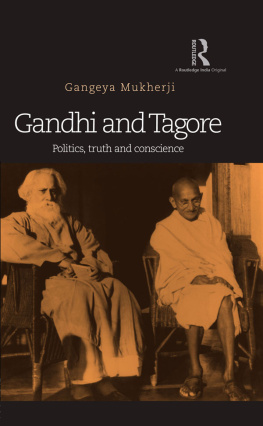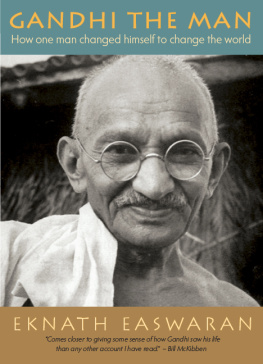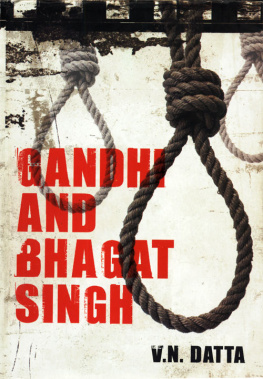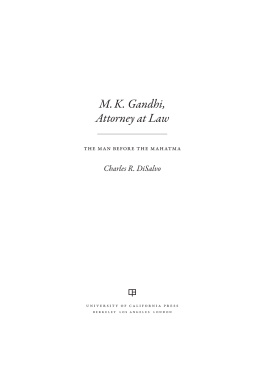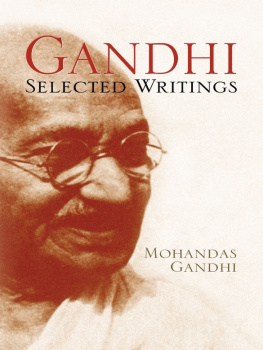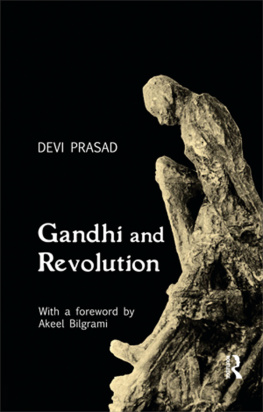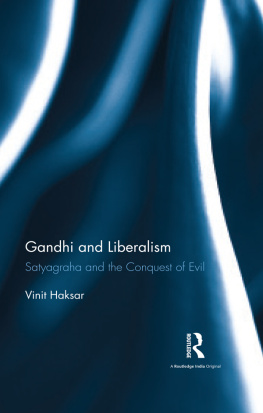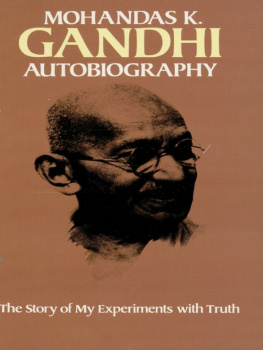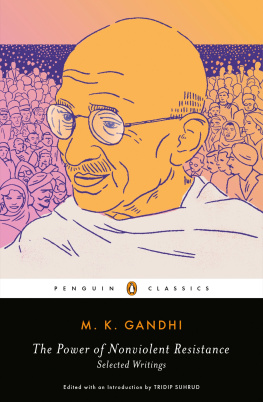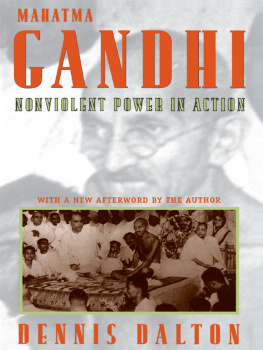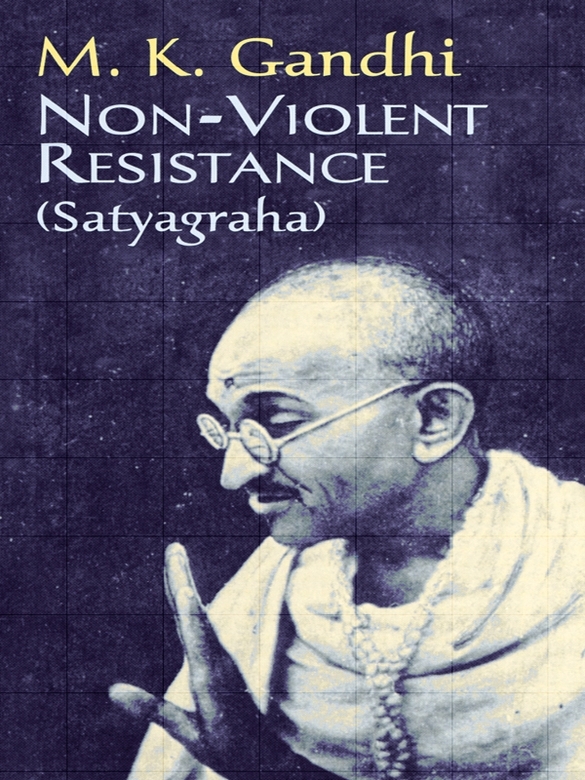1
SATYAGRAHA, CIVIL DISOBEDIENCE PASSIVE RESISTANCE, NON-CO-OPERATION
Satyagraha is literally holding on to Truth and it means, therefore, Truth-force. Truth is soul or spirit. It is, therefore, known as soul-force. It excludes the use of violence because man is not capable of knowing the absolute truth and, therefore, not competent to punish. The word was coined in South Africa to distinguish the non-violent resistance of the Indians of South Africa from the contemporary passive resistance of the suffragettes and others. It is not conceived as a weapon of the weak.
Passive resistance is used in the orthodox English sense and covers the suffragette movement as well as the resistance of the Non-conformists. Passive resistance has been conceived and is regarded as a weapon of the weak. Whilst it avoids violence, being not open to the weak, it does not exclude its use if, in the opinion of a passive resister, the occasion demands it. However, it has always been distinguished from armed resistance and its application was at one time confined to Christian martyrs.
Civil Disobedience is civil breach of unmoral statutory enactments. The expression was, so far as I am aware, coined by Thoreau to signify his own resistance to the laws of a slave State. He has left a masterly treatise on the duty of Civil Disobedience. But Thoreau was not perhaps an out and out champion of non-violence. Probably, also, Thoreau limited his breach of statutory laws to the revenue law, i.e. payment of taxes. Whereas the term Civil Disobedience as practised in 1919 covered a breach of any statutory and unmoral law. It signified the resisters outlawry in a civil, i.e., non-violent manner. He invoked the sanctions of the law and cheerfully suffered imprisonment. It is a branch of Satyagraha.
Non-co-operation predominantly implies withdrawing of co-operation from the State that in the non-co-operators view has become corrupt and excludes Civil Disobedience of the fierce type described above. By its very nature, non-co-operation is even open to children of understanding and can be safely practised by the masses. Civil Disobedience presupposes the habit of willing obedience to laws without fear of their sanctions. It can, therefore, be practised only as a last resort and by a select few in the first instance at any rate. Non-co-operation, too, like Civil Disobedience is a branch of Satyagraha which includes all non-violent resistance for the vindication of Truth.
Young India, 23-3-21
2
DOMESTIC SATYAGRAHA
I had read in some books on vegetarianism that salt was not a necessary article of diet for man, that on the contrary saltless diet was better for health. I had deduced that a brahmachari benefited by a saltless diet. I had read and realized that the weak-bodied should avoid pulses. I was very fond of them. Now it happened that Kasturba, who had a brief respite after that operation, had again begun getting hemorrhage and the malady seemed to be obstinate. Hydropathic treatment by itself did not answer. Kasturba had not much faith in my remedies though she did not resist them. She certainly did not ask for outside help. So when all my remedies had failed, I entreated her to give up salt and pulses. She would not agree, however much I pleaded with her, supporting myself with authorities. At last she challenged me saying that even I could not give up these articles if I was advised to do so. I was pained and equally delighted, delighted in that I got an opportunity to shower my love on her. I said to her: You are mistaken. If I was ailing and the doctor advised me to give up these or any other articles I should unhesitatingly do so. But there! Without any medical advice, I give up salt and pulses for one year, whether you do so or not.
She was rudely shocked and exclaimed in deep sorrow : Pray forgive me. Knowing you, I should not have provoked you. I promise to abstain from these things, but for heavens sake take back your vow. This is too hard on me.
It is very good for you to give up these articles. I have not the slightest doubt that you will be all the better without them. As for me, I cannot retract a vow seriously taken. And it is sure to benefit me, for all restraint, whatever prompts it, is wholesome for man. You will therefore leave me alone. It will be a test for me, and a moral support to you in carrying out your resolve.
So she gave me up. You are too obstinate. You will listen to none, she said, and sought relief in tears.
I would like to count this incident as an instance of Satyagraha and as one of the sweetest recollections of my life.
Medically there may be two opinions as to the value of a saltless and pulseless diet, but morally I have no doubt that all self-denial is good for the soul. The diet of a man of self-restraint must be different from that of a man of pleasure just as their ways of life are different.
The Story of My Experiments with Truth , Part IV Chapter XXIX
3
SATYAGRAHA
For the past thirty years I have been preaching and practising Satyagraha. The principles of Satyagraha, as I know it today, constitute a gradual evolution.
Satyagraha differs from Passive Resistance as the North Pole from the South. The latter has been conceived as a weapon of the weak and does not exclude the use of physical force or violence for the purpose of gaining ones end, whereas the former has been conceived as a weapon of the strongest and excludes the use of violence in any shape or form.
The term Satyagraha was coined by me in South Africa to express the force that the Indians there used for full eight years and it was coined in order to distinguish it from the movement then going on in the United Kingdom and South Africa under the name of Passive Resistance.
Its root meaning is holding on to truth, hence truth-force. I have also called it Love-force or Soul-force. In the application of Satyagraha I discovered in the earliest stages that pursuit of truth did not admit of violence being inflicted on ones opponent but that he must be weaned from error by patience and sympathy. For what appears to be truth to the one may appear to be error to the other. And patience means self-suffering. So the doctrine came to mean vindication of truth not by infliction of suffering on the opponent but on ones self.
But on the political field the struggle on behalf of the people mostly consists in opposing error in the shape of unjust laws. When you have failed to bring the error home to the lawgiver by way of petitions and the like, the only remedy open to you, if you do not wish to submit to error, is to compel him by physical force to yield to you or by suffering in your own person by inviting the penalty for the breach of the law. Hence Satyagraha largely appears to the public as Civil Disobedience or Civil Resistance. It is civil in the sense that it is not criminal.
The lawbreaker breaks the law surreptitiously and tries to avoid the penalty, not so the civil resister. He ever obeys the laws of the State to which he belongs, not out of fear of the sanctions but because he considers them to be good for the welfare of society. But there come occasions, generally rare, when he considers certain laws to be so unjust as to render obedience to them a dishonour. He then openly and civilly breaks them and quietly suffers the penalty for their breach. And in order to register his protest against the action of the law givers, it is open to him to withdraw his co-operation from the State by disobeying such other laws whose breach does not involve moral turpitude.

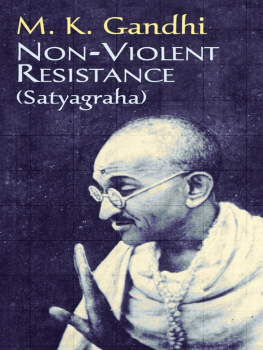
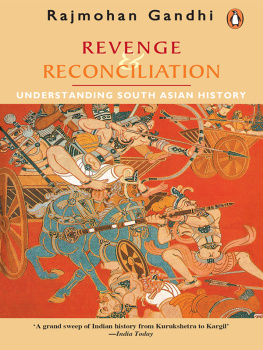
![Gandhi - Gandhi: [the true man behind modern India]](/uploads/posts/book/175484/thumbs/gandhi-gandhi-the-true-man-behind-modern-india.jpg)
